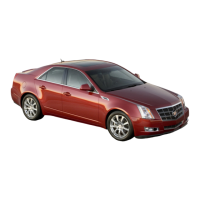Do you have a question about the Cadillac LYRIQ 2024 and is the answer not in the manual?
Explains hazard symbols and their meanings for safety.
Details the layout and components of the vehicle's instrument panel.
Covers the operation and security of vehicle keys and door locking mechanisms.
Explains theft-deterrent features and alarm systems for vehicle security.
Explains power windows, express operation, and safety functions.
Instructions on adjusting front and rear head restraints for occupant safety.
Proper usage, care, and safety checks for seat belts.
Overview of airbag types, locations, and operation.
Guidelines for safely installing and using child restraint systems.
Overview of main controls including steering wheel, horn, and wipers.
How to adjust the steering wheel for optimal driving position.
Operation of wipers and washer fluid system, including Rainsense.
How to use and troubleshoot the wireless charging feature for smartphones.
Explains the meaning and function of various warning lights and gauges.
Details the reconfigurable instrument cluster display and selectable views.
Displays high voltage battery state of charge and estimated range.
Shows instantaneous charge and consumption power of the high voltage battery.
Explains driver and passenger seat belt reminder lights and chimes.
Indicates electrical issues with the airbag system.
Indicates a fault with the high voltage battery.
Indicates a condition requiring vehicle service.
Alerts for potential brake system problems or low brake fluid.
Indicates when the parking brake is applied or if there's an EPB system issue.
Indicates ABS malfunction or if ABS is not functioning.
Explains the different colours and indicators for Lane Keep Assist system status.
Displays green when a vehicle is detected ahead, amber when too close.
Alerts to a detected pedestrian in front of the vehicle.
Explains the indicators for TCS and ESC system operation or malfunction.
Alerts for low tyre pressure or provides information about tyre pressures.
Indicates problems with arming/disarming the theft-deterrent system or if the vehicle won't start.
Indicates when Adaptive Cruise Control (ACC) is on, ready, or active.
Alerts when drowsiness assistance is unavailable, disabled, or requires service.
Important information about electric vehicle charging and connected equipment.
View current charging status and specify next charging session.
How to set up custom charging plans for each day of the week.
Displays vehicle system status and information across three main zones.
Lists possible DIC information displays and their locations.
Details the touchscreen interface for infotainment and vehicle controls.
Information projected onto the windscreen, including settings and operation.
Describes different HUD views: Speed, Active Safety, Navigation.
Indicates vehicle status and actions required, displayed on DIC and infotainment.
Alerts for reduced acceleration drive, and power reduction due to temperature.
Controls for exterior lamps, including headlights and parking lights.
Operates exterior lamps via infotainment screen or manual controls.
Headlights turn on automatically when dark or in tunnels.
Main-beam headlights move horizontally to improve road illumination around bends.
Adjusting audio controls and using phone functions via the steering wheel.
Guidance on operating the infotainment system's audio, phone, and navigation features.
Details on AM-FM radio, DAB radio, and radio reception.
Instructions for playing the radio, finding stations, and tuning.
Guidance on connecting media devices via USB and Bluetooth.
Information on Bluetooth connectivity, pairing, and using the phone system.
How the vehicle's Bluetooth system interacts with mobile devices.
Step-by-step guide to pairing and connecting a mobile device to the Bluetooth system.
Instructions for activating and using Apple CarPlay and Android Auto.
Accessing and adjusting various vehicle settings via the infotainment display.
Menu for adjusting climate, collision/detection, comfort, lighting, and locks settings.
Adjusts different driver assistance system settings.
Adjusts different remote lock settings.
Overview of dual automatic and rear climate control systems.
Details operation of climate controls: ON/OFF, AUTO, fan, temperature, and modes.
Controls for fan speed, air delivery, AC, temperature, and Sync via infotainment screen.
System automatically controls fan speed, air delivery, and recirculation for comfort.
Controls located on the rear of the centre console for rear climate settings.
Tips for maximizing energy efficiency and range.
Tips to maximize energy efficiency and range, considering temperature and usage.
Exercise good judgment and focus on driving, avoiding diversions.
Always expect the unexpected and wear seat belts.
Factors in controlling a vehicle: braking, steering, and acceleration.
Understanding perception and reaction time in braking.
Understanding and handling skidding situations.
How rain and wet roads affect traction and stopping ability.
Driving advice for steep hills, including battery charge and brake usage.
Driving tips and precautions for snow and ice conditions.
Determining correct load limits, including occupant and cargo weight.
Procedures for starting, stopping, and restarting the vehicle.
Warnings and precautions when leaving the vehicle with the propulsion system on.
Allows accelerator pedal control for deceleration and stopping.
Information on electric brake boost, ABS, parking brake, and brake assist.
Helps prevent braking skids and maintain steering while braking hard.
How to apply and release the Electric Parking Brake (EPB).
Captures energy from moving vehicle to store in high voltage battery.
Helps limit wheel spin and maintain control, especially on slippery roads.
Adaptive Cruise Control (ACC) allows selection of set speed and following gap.
Allows selection of cruise control set speed and following gap.
Features to help avoid crashes or reduce damage while driving, reversing, parking.
Uses sensors to detect parking space and automatically park or unpark vehicle.
Automatically brakes hard to avoid or reduce harm from reversing crashes.
Systems that help avoid or reduce crash damage while driving.
Allows setting a maximum speed limit to prevent exceeding it.
Helps avoid or reduce harm from front-end crashes by providing alerts.
Helps avoid or reduce damage from front-end collisions with pedestrians and vehicles.
Helps avoid or reduce harm from front-end collisions with pedestrians and bicyclists.
Warnings and recommendations for DIY vehicle service, especially high voltage components.
Information on the high voltage and standard 12-volt batteries.
Guidance on service and handling of the high voltage battery.
Overview of high voltage devices, wiring, and overload protection.
Warnings and precautions regarding high voltage components and wiring.
Information on tyres, including maintenance, replacement, and types.
Importance of correct tyre inflation pressure for effective operation.
How the TPMS monitors tyre pressure and alerts for low pressure.
Safe procedures for jump starting a vehicle with a dead battery.
General information and safety rules for towing a trailer.
Schedule for performing required services and inspections.
Information on the 112 based eCall system for emergency calls.
| Brand | Cadillac |
|---|---|
| Model | LYRIQ 2024 |
| Category | Automobile |
| Language | English |











